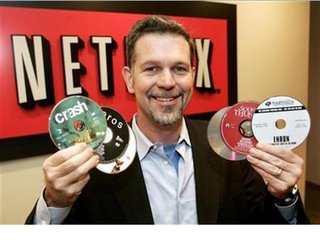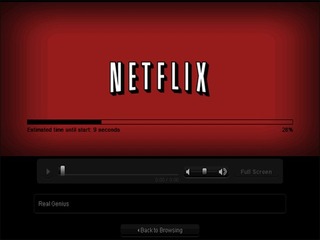Should Reed Hastings resign from Netflix?
The price hike and Qwikster indecision has many calling for Hastings to step down
 No one knows how to piss off its own customers like Netflix does. Just weeks after the company announced that it would be splitting off its DVD business to focus exclusively on its digital platform, Netflix is now playing taksies-backsies and has announced that it will NOT be splitting its business. In other words, there will be no Qwikster, and all you customers who were ticked off enough to cancel your Netflix subscription: Netflix welcomes you back with open arms.
No one knows how to piss off its own customers like Netflix does. Just weeks after the company announced that it would be splitting off its DVD business to focus exclusively on its digital platform, Netflix is now playing taksies-backsies and has announced that it will NOT be splitting its business. In other words, there will be no Qwikster, and all you customers who were ticked off enough to cancel your Netflix subscription: Netflix welcomes you back with open arms.
So customers are overjoyed, right? Nope. Reed Hastings’ five a.m. blog post announcing the change back to a combination DVD-and-streaming platform (before it even took off) met with an icy reception. But can you blame subscribers for not racing back to Netflix after being burned? The rapid succession of business shifts—from the 60% price hike announced in July to the Qwikster announcement…to the Qwikster unannouncement—has Netflix looking more like a five-year-old who was caught playing with matches and is now scrambling to talk his way out of it than a major global corporation with customers to please and shareholders to protect.
So, the question is: should Reed Hastings resign?
First of all, looking back at where Netflix was this time last year, who would’ve thought anyone would be calling for Hastings’ resignation? Only 11 months ago, Fortune had named Hastings the number one Businessperson of the Year, and Netflix stock was up over 200% since January 2010. At its highest point in July 2011, Netflix had reached $300 a share for a market cap of $15 billion.
Today, Netflix’s market cap is less than half that of its July peak, currently standing at $6.68 billion, and stock has fallen nearly 57% since July. Incidentally—shares were up this morning by some 8%, opening at $126 compared to Friday’s close of $117. So it sounds like shareholders are relatively pleased with Netflix’s move.
But Netflix’s bizarre flip-flopping over the last three months—starting with its sudden and massive price increase in July (which Reed Hastings maintains was necessary) to its Qwikster/no Qwikster indecisiveness—seems to point to a basic failure of leadership. Netflix’s scramble to stanch the flow of fleeing subscribers says nothing more than “Help! My stock has fallen and it can’t get up!”
At best, Hastings can be accused of laziness for failing to think through the whole Qwikster decision before announcing it. But at worst, the series of sudden shifts in pricing and the overall business model point to an impulsive decision-making process and a panicky approach to failure. And that is what has a number of people calling for Hastings’ resignation.
One commenter, Balaji Krishnapuram, captured the essence of the problem succinctly: “It’s time to fire Reed Hastings. Here’s a great way to destroy a company: 1) Infuriate customers by nearly doubling prices at one shot. 2) Make sure that significant numbers leave. If they still did not leave because of the price hike, well, kick them out by giving them even less value for the same $ (eg they have to maintain separate lists of movies in their queue). 3) Watch the share price drop like a rock. 4) Reverse the decision with a major PR fiasco that broadcasts the total lack of leadership. Rinse. Repeat.”
Krishnapuram was not alone in calling for Hastings’ resignation. A number of customers and observers pointed out that they’ve already switched their DVD service over to Blockbuster.
Which brings up another point: did Netflix just trip itself up in the race against competitors in the streaming business? Dish Network just unveiled Blockbuster Movie Pass, which allows Dish customers to stream movies and TV programs for just $10 a month. Amazon continues to add thousands of new titles to its Instant Video catalog, which is now up to 100,000 movies and TV shows, and lets Prime subscribers stream some 11,000 of those titles for free. And now Walmart is jumping into the game with Vudu, which recently took the number three spot among the top digital movie service providers.
So…bad timing, Netflix.
The flurry of sudden changes has already driven away hordes of customers. It all started with the price hike in July, the suddenness and scale of which cut Netflix’s subscriber forecast by one million and sent Netflix stock crashing to $155 from $208 over the course of two days. The Qwikster announcement drove away even more customers who were told to look elsewhere for DVDs—and many weren’t impressed enough with Netflix’s digital selection to stick with the company for streaming titles.
Now the announcement of Netflix’s decision to abandon Qwikster threatens to alienate future customers who don’t know what to expect from Netflix.
Can Hastings prove that he’s on top of things and not flailing like a madman before it’s too late?
The company did not respond to inquiries from VatorNews.
Related News

Starz to pull content from Netflix

Netflix chopping off its DVD arm, renamed Qwikster

